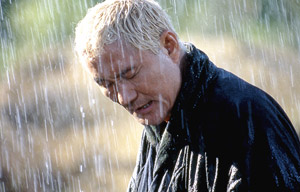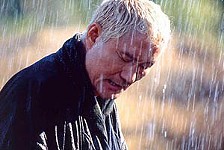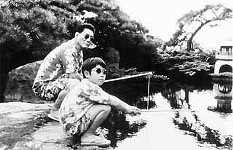
Zatôichi
2003, R, 116 min. Directed by Takeshi Kitano. Starring Takeshi Kitano, Michiyo Ookusu, Gadarukanaru Taka, Daigorô Tachibana.
REVIEWED By Marrit Ingman, Fri., Aug. 20, 2004
You may know a certain blind swordsman from the pulp novels of Kan Shimozawa and the films of Shintaro Katsu, but this ain’t your daddy’s Zatôichi. It’s wild and weird and wonderful, with the broad strokes and artistic signature of gore auteur "Beat" Takeshi, who also stars as the itinerant masseur whose walking stick conceals a samurai’s sword. There are moments of slapstick, particularly a droll parody of the standard "training" scene, but this is not a comedy. There are cleverly choreographed fight scenes and Kitano’s celebrated fountains of blood (rendered in CGI to make them prettier), but you’d be hard-pressed to call this Zatôichi an action movie. Rather, Kitano fills out the story with novelistic detail, developing each of the characters in Zatôichi’s band of outsiders. The film is better because of its languid pace and variegated narrative, but don’t go in expecting nonstop action. The story begins when Zatôichi wanders into a feudal village beset by rival gangs and takes shelter with a woman from his past (Ookusu). She knows him only as a masseur, but the thugs at the local sake stop take him for a samurai. Meanwhile, two mysterious geishas (Tachibana and Yuuko Daike) are killing gangsters, and a powerful ronin (the excellent Tadanobu Asano, of Takashi Miike’s Ichi the Killer) comes to town with his ailing sweetheart and needs money badly enough to hire himself out as a bodyguard for the corrupt Ginzu mob. Of course the threads of the story inevitably interweave, but this is not a thriller, and the film’s final showdown is so brief and straightforward that it’s a little disappointing. Kitano cares more about the philosophical implications of the situation—about power and its abuses, about the flaws in otherwise honorable people—than he does about driving home the ending. Rather he loads up the movie with flashbacks and symbolic flourishes (when a group of cherubic-looking village kids tear down and assault a straw man built as an offering, it brings to mind the children playing with ants in the opening of The Wild Bunch). The story is more confusing than it has to be, and the whole affair would probably bog down were it not buoyed by Kitano’s palpable enthusiasm for the craft of filmmaking. There’s so much love and care on the screen that Zatôichi is never boring or obscure. The sound of a sudden downpour inspires flashbacks; the sound of villagers hoeing in a crude patch of dirt echoes in Keiichi Suzuki’s amusing and pitch-perfect score. Kitano takes time out to tweak the notion of gender roles (as he did previously in Taboo) and he plays fast and loose with anachronism. Though he appears gruff and deadpan onscreen as the hero, Kitano is as playful as Chaplin behind the camera. (I will not, as other reviewers have done, give away the delightful oddball ending.) Beneath its layers of epic detail, this Zatôichi is cinematic cotton candy.
A note to readers: Bold and uncensored, The Austin Chronicle has been Austin’s independent news source for over 40 years, expressing the community’s political and environmental concerns and supporting its active cultural scene. Now more than ever, we need your support to continue supplying Austin with independent, free press. If real news is important to you, please consider making a donation of $5, $10 or whatever you can afford, to help keep our journalism on stands.
Marc Savlov, Aug. 10, 2001
Marjorie Baumgarten, June 30, 2000
Nov. 9, 2007
Zatôichi, Takeshi Kitano, Takeshi Kitano, Michiyo Ookusu, Gadarukanaru Taka, Daigorô Tachibana










